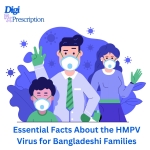
Human Metapneumovirus (HMPV) is becoming an increasingly discussed topic in the healthcare community. For families in Bangladesh, understanding HMPV is crucial as it can lead to respiratory illnesses, especially during the winter months when cases of viral infections surge. This article explores the essential facts about HMPV, its symptoms, prevention methods, and what Bangladeshi families need to know to stay protected.
What is HMPV?
HMPV is a respiratory virus that primarily causes illnesses like the common cold, bronchitis, and pneumonia. It belongs to the same viral family as RSV (Respiratory Syncytial Virus) and often affects children, elderly individuals, and people with weak immune systems.
- Discovery: Identified in 2001 by Dutch scientists.
- Spread: Transmitted via respiratory droplets, direct contact, or contaminated surfaces.
Symptoms of HMPV
The symptoms of HMPV can range from mild to severe, depending on the individual’s age and overall health.
-
Mild Symptoms:
- Runny nose
- Cough
- Sore throat
- Mild fever
-
Severe Symptoms (in high-risk individuals):
- Shortness of breath
- Wheezing
- Chest congestion
- High fever
- Fatigue
If severe symptoms appear, immediate medical attention is necessary, especially for children and elderly family members.
Who is at Risk?
Certain groups are more susceptible to severe complications from HMPV:
- Children under five years: Their developing immune systems make them more vulnerable.
- Elderly individuals: Age-related decline in immunity increases risks.
- People with chronic conditions: Asthma, diabetes, or heart problems can worsen outcomes.
- Immunocompromised individuals: Cancer patients, transplant recipients, or those with autoimmune diseases.
How Does HMPV Spread?
HMPV spreads in ways similar to the flu and other respiratory viruses:
- Respiratory droplets: Sneezing, coughing, or talking.
- Close contact: Touching an infected person’s hands or face.
- Contaminated surfaces: The virus can survive on surfaces like doorknobs, toys, or mobile phones.
Prevention Tips for Bangladeshi Families
Preventing HMPV requires adopting good hygiene and health practices:
-
Handwashing:
- Wash hands frequently with soap and water for at least 20 seconds.
- Use hand sanitizer (with 60% alcohol) if soap is unavailable.
-
Wearing Masks:
- Wear masks in crowded public spaces to minimize exposure to respiratory droplets.
-
Avoiding Close Contact:
- Stay away from people showing symptoms like coughing or sneezing.
- Keep symptomatic family members isolated.
-
Regular Cleaning:
- Disinfect frequently touched surfaces, such as door handles, phones, and toys.
-
Boosting Immunity:
- Eat a balanced diet rich in vitamins, especially Vitamin C.
- Ensure children and elderly family members get adequate rest and hydration.
Treatment for HMPV
There is no specific antiviral treatment for HMPV. Management focuses on alleviating symptoms:
-
For mild cases:
- Rest and hydration.
- Over-the-counter medications for fever and pain (consult a doctor before administering to children).
-
For severe cases:
- Hospitalization may be required for oxygen therapy or intensive care.
Always consult a doctor if symptoms worsen or persist for more than a week.
Conclusion
HMPV is a significant health concern, especially during the winter season in Bangladesh. Awareness and preventive measures are vital to protecting your family from this respiratory virus. By maintaining good hygiene, staying informed, and seeking timely medical attention, Bangladeshi families can reduce the risks posed by HMPV and other winter respiratory illnesses.
How to Stay Informed
Reliable information is critical to managing and preventing HMPV effectively. Bangladeshi families can stay informed through:
- Directorate General of Health Services (DGHS), Bangladesh: DGHS Website
- World Health Organization (WHO): WHO Resources on Respiratory Illnesses
- Centers for Disease Control and Prevention (CDC): CDC Information on HMPV
- icddr,b (International Centre for Diarrhoeal Disease Research, Bangladesh): icddr,b
